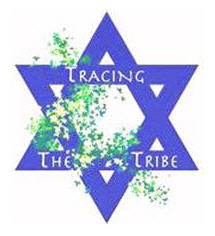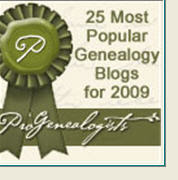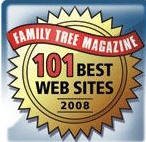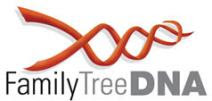Randy Seaver at Geneamusings often challenges us with interesting topics on his Saturday Night challenge. The assignment is to answer these questions about our genealogy life:
1. When did you start genealogy research? 1989.
2. Why did you start doing research? As most readers know by now, my daughter brought home a one-page Hebrew School assignment asking her to write the names of several generations of family: "Even your great-grandparents." That weekend, we attended a lifecycle celebration in my husband's huge Persian family in Los Angeles. We began asking questions and before we knew it, we came home with several hundred cocktail napkins covered with family information back to the 1800s, supplied by some of the family's "walking encyclopedias." Our daughter turned to me and said that now we had to do my side of the family.
3. What was your first big success in research? With my daughter, I visited the Santa Monica (California) Family History Center and went through reels of microfilm. We found the first written evidence of our Talalay family in the New York arrival record of my great-grandmother. That made the quest very real for me, and also very important, because there were few people to ask.
4. What is your biggest genealogy regret? A small one: While doing research for a high school history project at the New York Public Library, I found a postcard stuck in a book (name forgotten) written by my grandfather to his sister. Instead of taking the postcard, which was not library property, I replaced it, and merely told my family about it when I came home. Everyone said I should have brought it home.
The regret category winner is this one: A long, long time ago (way before the Internet, before email, before cellphones), when we were living in Teheran and I had never heard of genealogy, I visited Israel, as we frequently did in those days.
On a whim, I checked the English language phone book for what I had always heard was our original name, Talalay. Shockingly, there was a listing for Avram Talalay, a carpenter/furniture maker - the same profession that ran in our family. I took down all the details and the phone number but never called.
For some reason, I thought he would only speak Hebrew or Yiddish, neither of which I knew. The idea of asking the hotel's front desk to run interference simply never occured to me. Yes, yes, I know - you're shaking your heads, muttering that youth is wasted on the young. I agree.
The scrap of paper was put away, only to be discovered decades later while we were moving from Los Angeles to Nevada (after I had recently discovered genealogy).
Fast forward another huge chunk of time, when I was working with a new-found cousin in Toronto, the late Victor Talalay, on putting together the pieces of our family. I mentioned my scrap of paper, Victor said "hold on." I heard rustling of papers, drawers opening and closing. "Is this the information you found?" he asked, reading me the same exact information. Victor had been in Israel around the same time and found the same information. He hadn't called either.
As soon as I got off the phone with Victor, I wrote to the address in Israel. Very soon I received a letter from the granddaughter saying that her grandfather had died very recently, but that other relatives were there.
I sat on an important family connection for decades, as had Victor. It never occurred to us that it was strange that in a Hebrew-speaking country, our relative had chosen the option to place his name and details in the English directory. The granddaughter told me that her grandfather had always hoped relatives would come looking for him so that's why he made sure to list the information. Two of us were there and found the listing, neither of us called. Her grandfather died without hearing from anyone. I cried for weeks.
The moral of this sad tale: Never procrastinate, never wait. Always follow up on the smallest details as soon as is humanly possible. What this story proved: Our family, despite being separated by time and geography, share the procrastination and packrat genes.
5. What are you best known for in the genealogy world? Blogging Jewish genealogy, beginning a discussion about the Sephardic origins of an increasing number of Ashkenazi families, writing about Jewish genealogy in general audience newspapers and magazines.
6. What is your professional status in genealogy? Not certified, but thinking about it - if there is ever enough time. I don't take clients, but refer people to friends working in those particular fields.
7. What is your biggest genealogy achievement? Two major achievements: 1. Genealogy columnist at the Jerusalem Post (1999-2005, "It's All Relative") which garnered an international readership for the twice-monthly column in print and online, bringing genealogy to a wide general readership, most of whom had never heard the term. 2. Being asked by JTA (thank you, Andy Neusner!) to start blogging with Tracing the Tribe, which has racked up (since August 2006) 1,822 published posts (average about two per day, but actually sometimes as many as five or six!), with many more in draft.
8. What is the most FUN you've had doing genealogy? Meeting geneablogger colleagues at the Southern California Genealogical Society 2008 Jamboree. Genealogically speaking, two events qualify. 1. Discovering the "lost" Bombay branch of the Dardashti family here in Israel, and 2. Finding a 1353 document (thank you, Maria Jose!) in a Spanish archive for our Sephardic-rooted Talalay family.
9. What is your favorite genealogy how-to book? All books hinging on either Ashkenazi or Sephardi genealogy, ancestry and how-to, such as Dr. Jeffrey S. Malka's "Sephardic Genealogy."
10. What notable genealogist would you like to meet someday? I would have liked to meet Rabbi Malcolm Stern, who is called the father of modern Jewish genealogy and whose research on early American Jewish families is essential material.
Thanks, Randy, for this suggestion!
08 March 2009
Subscribe to:
Post Comments (Atom)
























Is Amazon a good place to find books on Ashkenazi or Sephardic genealogy, or is there a more specialized source? Could you name a few of your favorite books?
ReplyDeleteThank you,
Dee
Hi, Dee.
ReplyDeleteAvotaynu.com publishes most of the essential Jewish genealogy books. I would start with them to see what is available. Genealogy books are generally expensive, but nothing beats having your very own copy on your own shelf for quick reference. Occasionally, Avotaynu has special sales for pre-publication of books. And if you visit their booth at the annual IAJGS conferences you can often save on shipping and occasionally receive discounts. see http://avotaynu.com/recommend.htm for Avotaynu's recommended books.
Amazon does carry genealogy books. Many books are also available on Amazon, sometimes at a lower price. Caveat for Amazon: check edition dates and see if they are old ones or newly updated ones. And sometimes Amazon claims it can get books from certain publishers but really can't, so check things out carefully.
As far as Sephardic books - there is a plethora of Sephardic-topic books, not necessarily genealogical, but still with a lot of history and other aspects that genealogists find interesting and necessary. Some books are out-of-print but a few have been recently released. For lists of specific Sephardic publications, check Sephardim.com and SephardicGen.com.
Jewish Publication Society JPS has good things, and many university presses have Sephardic topics books in their catalogs.
A good idea about posting a library of essential Jewish genealogy books. I will do that in a future post.
Schelly